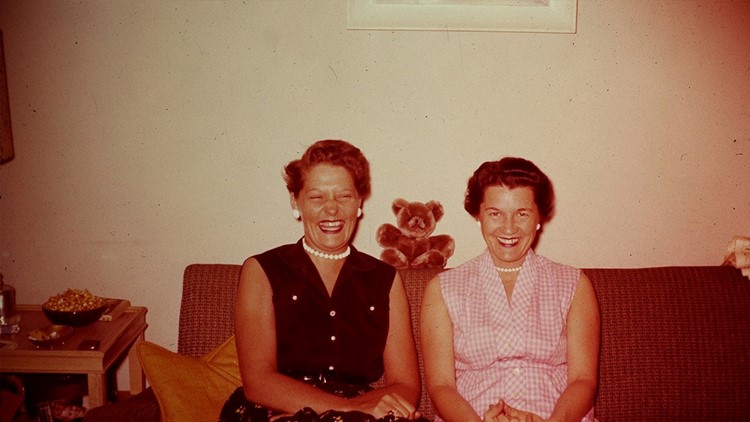While October marks LGBTQ History Month, these non-fiction films and docuseries can (and should) be watched any time. All of them re-examine the history, rights and visibility of the gay, lesbian, bisexual and transgender community through various perspectives and points in time, from the fight for rights during the pre-Stonewall era, how the AIDS epidemic had a lasting impact on the community, to depictions in media today.
Most are now streaming on various platforms, like Apple TV+, HBO Max and Netflix, while others are available to rent. No matter what, these are eras, people and places in history that should not be forgotten.
Before Stonewall
While the Stonewall Riots of 1969 in New York City are largely considered the turning point for LGBTQ rights in America, directors Greta Schiller and Robert Rosenberg’s film recounts the perceptions of queer life, particularly its relationship with police and censorship, in the decades prior. The film features interviews with the likes of Allen Ginsberg, Gladys Bentley, José Sarria, Mabel Hampton and more.
The Celluloid Closet
Based on Vito Russo's 1981 book, The Celluloid Closet: Homosexuality in the Movies, the documentary explores the extended history of the LGBTQ community onscreen, particularly in films, and how those depictions evolved over the decades and influenced perceptions of the community off-screen. Narrated by Lily Tomlin, the film features interviews with everyone from Boys in the Band playwright Mart Crowley to Harvey Fierstein to Susan Sarandon.
Disclosure
The 2020 Netflix film directed by Sam Feder and executive produced by Laverne Cox examines the history of transgender visibility from the earliest days of cinema to TV’s current scripted dramas -- and how that has evolved over decades. The documentary features interviews with Cox as well as Lilly Wachowski, Yance Ford, Mj Rodriguez, Jamie Clayton and Chaz Bono and more as they share their own experiences of seeing themselves represented (or misrepresented) onscreen in everything from Dog Day Afternoon to The Crying Game, and shows like The Jeffersons, The L-Word and Pose.
Equal
The innovative, four-part docuseries reclaims forgotten or overlooked LGBTQ trailblazers from the post-war America to the pre-Stonewall uprising eras through never-before-seen archival footage, untold backstories and portrayals by Hollywood’s most prominent out actors, including Anthony Rapp, Cheyenne Jackson, Heather Matarazzo, Isis King, Jamie Clayton and Samira Wiley.
How to Survive a Plague
This harrowing 2012 film from director David France chronicles the rise of the AIDS epidemic and the efforts of groups like ACT UP and TAG to raise awareness for it and fight against the deadly infection that killed thousands of gay men. The film is told through hours of archival footage, news coverage, recordings of meetings inside ACT UP as well as interviews looking back on key events and moments during that time.
The Death and Life of Marsha P. Johnson
Marsha P. Johnson has been called “the Rosa Parks of the LGBTQ movement,” because of the pivotal role she played in the Stonewall riots of 1969 alongside the likes of Sylvia Rivera and others. She was also a pioneer of the gay liberation movement, co-founder of S.T.A.R. (Street Transvestites Action Revolutionaries), a self-proclaimed drag queen, community leader and, according to her friend and roommate, Randy Wicker, an “Andy Warhol model, prostitute, starving actress and saint.” Her life and tragic death is captured in the Netflix doc from David France, who says, “If you were in New York -- in gay New York, in queer New York -- during her lifetime, you knew Marsha.”
Paris Is Burning
Filmed in the late-’80s, Jennie Livingston’s documentary chronicles the ballroom scene through the lives of several black and Latino transgender women and drag queens from different houses in New York City. Going beyond the competitions, the film shows what it was like to be a queer person of color in the city, struggling to survive amid poverty, homophobia, and the AIDS crisis. Fans of Pose will find this particularly worth rewatching because of how much of the FX drama’s various storylines are inspired by what happened to the real-life characters documented in the film.
A Secret Love
A Secret Love is one of several Netflix projects that shine a light on untold histories from Ryan Murphy. The heartfelt and emotional film tells the lifelong love story between Pat Henschel and former baseball player Terry Donahue. While Donahue’s time as a catcher for the Peoria Redwings of the All-American Girls Professional Baseball League inspired the 1992 classic A League of Their Own, her nearly seven decades-long romance with Henschel did not make it into the story. But in the doc, the couple finally tell their truth, from the first time they met to eventually coming out. “Those ladies are heroes and unseen heroes is very much in my wheelhouse,” Murphy says, explaining his desire to tell stories about varied, overlooked parts of history. “I’m interested in people not being seen. I’m interested in using whatever influence I have, which is like a big fat spotlight and shining it into dark places that haven't had a lot of attention.”
The Times of Harvey Milk
Narrated by Harvey Fierstein, the film chronicles the rise of San Francisco's Castro district politician, Harvey Milk, and his efforts to become California's first openly gay public official and life in office after he’s elected. The film also examines his gay political achievements before his life and time in office were cut short by his assassination in November 1978 at San Francisco's city hall.
Visible: Out on Television
While television in America has been around since the 1930s, it wasn’t until the ‘70s before the LGBTQ community started seeing positive portrayals of themselves onscreen. Now, 50 years later the five-part docuseries examines the evolution of visibility on the small screen. “It’s easy to turn on your television now and go, ‘Almost every show has an LGBTQ character,’ and just assume that that’s a natural thing,” producer Wilson Cruz says. “But, you know, that didn’t just happen. It happened because a lot of people risked a lot in order to tell those stories.” Over the course of the docuseries, an expansive list of A-list stars and notable LGBTQ celebrities -- everyone from Billy Crystal to Tim Gunn -- candidly discuss how storytelling and portrayals have changed over time.
We Were Here
This incredibly powerful documentary looks back on life in 1970s San Francisco, which became a safe haven for the gay and lesbian community, providing one of the few places in America where they could live openly and safely from discrimination. But a decade later, the city and the community alike were ravaged by the AIDS epidemic, becoming the epicenter for the deadly infection, which took the lives of thousands of gay men.
RELATED CONTENT:



